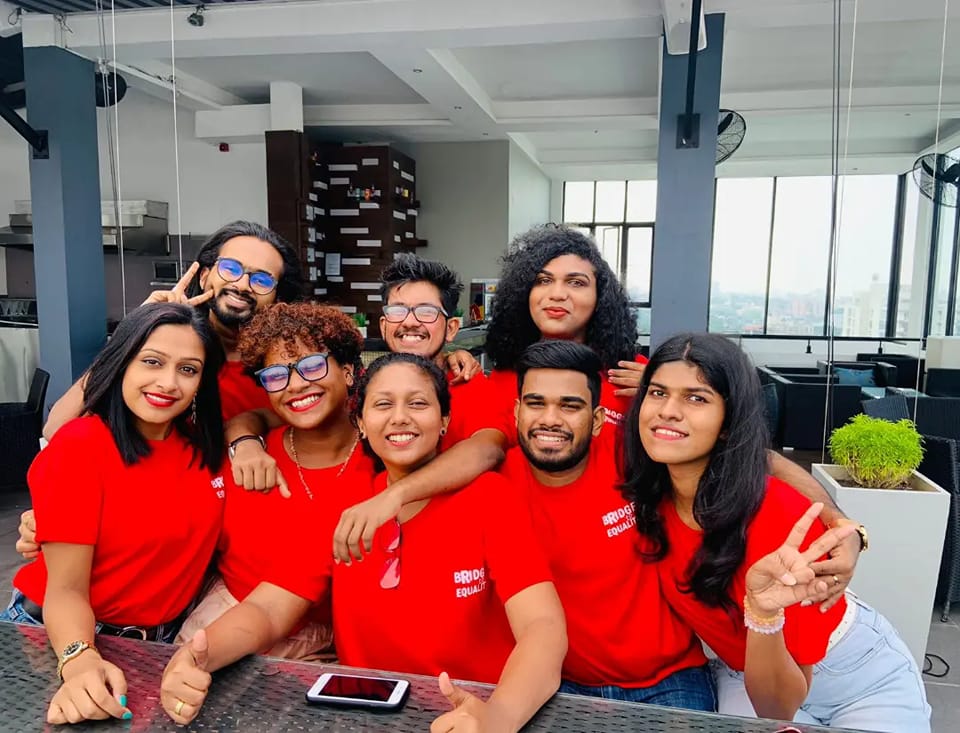May 26, 2023 Bridge Team
In Sri Lanka, the fight for LGBTQIA+ rights has gained momentum with the Supreme Court last week giving the green light to passing the Private Members’ Bill presented by Member of Parliament and attorney Premnath C. Dolawatte to Parliament seeking the amendment of sections 365 and 365A of the Penal Code, which would decriminalise homosexuality.
This has led to the revival of discourse on the discrimination and violence faced by LGBTQIA+ persons in the country, fuelled especially by ill-defined laws that can be easily misused to target persons. Looking at the issues faced by LGBTQIA+ communities in Sri Lanka from another angle are the young activists from the Young Activists Collective, who shed light on the challenges faced by LGBTQIA+ individuals within the country’s education system.
Vishwa Pathum, Chamodari Lakshani, and Harsha Perera, passionate advocates for change, emphasise the need for inclusive education, societal acceptance, and stronger legal protections. Together, their voices weave a narrative that underscores the intersectionality between LGBTQIA+ rights and education in Sri Lanka.
Vishwa Pathum, a fervent LGBTQIA+ activist, highlighted the prevailing issues within Sri Lanka’s education system. Vishwa voiced concerns about the system’s shortcomings, stating, “Our country’s education system is far behind compared to the rest of the world. Most of the time, only the positive aspects are showcased, while the numerous problems faced by students, especially those from the LBGTQIA+ community, remain hidden.”
One of the prominent challenges discussed by Vishwa is the lack of comprehensive sex education in schools. “People of different gender identities have to face unpleasant situations due to the absence of proper sex education. This ignorance leads to discrimination and ridicule,” Vishwa explained. They further recalled a personal incident, where after disclosing their identity, they faced adversity. Vishwa shared: “Even subjects like dance, home economics, and science become reasons for ridicule and marginalisation.”
Chamodari Lakshani, another passionate activist from the Young Activists Collective, shared a deeply personal journey of discovering their queer identity. Reflecting on their experiences, Lakshani revealed the struggles faced by many in the LGBTQIA+ community, particularly within their own homes. “Parents, peers, friends, teachers – there was no safe space to openly discuss my identity and understand who I am,” Chamodari recounted. They raised a crucial question: “Is it a problem to live authentically as a queer person? Don’t we have the right to live in this society?”
Chamodari highlighted the devastating consequences of societal pressure and non-acceptance. They shared a heart-wrenching anecdote about a trans youth who took their own life due to the inability to cope with familial rejection. Chamodari passionately stated: “We are all human beings with the right to live authentically. It is essential to respect and celebrate our differences to create a more beautiful and diverse world.”
Harsha Perera, a non-cis activist, delved into the violations of human rights and safety experienced by the LGBTQIA+ community in Sri Lanka. Harsha shed light on the alarming prevalence of physical violence, assaults, harassment, and wrongful arrests targeting LGBTIQ individuals. They asserted, “The lack of legal protections against discrimination has left our community vulnerable.”
Harsha raised concerns about specific sections of the Penal Code used to target LGBTQIA+ individuals. “Arrests are made under the guise of concealment of identity and indecent sexual behaviour, even for harmless expressions of affection,” said Harsha. They emphasised the urgent need for legal reforms to safeguard the community’s safety and rights.
Through their powerful narratives, Vishwa, Chamodari, and Harsha unite their voices to advocate for change in Sri Lanka’s education system. They shed light on the need for inclusive sex education, acceptance within families and society, and enhanced legal protections against discrimination.
It is evident that a transformation is necessary to create a safe and inclusive environment for all students, regardless of their sexual orientation or gender identity. By embracing comprehensive sex education, fostering acceptance within families, and implementing stronger legal safeguards, Sri Lanka can pave the way for a brighter future where LGBTQIA+ individuals can thrive academically, emotionally, and socially.
Embracing diversity and creating an inclusive society benefits not only the LGBTQIA+ community but also the nation as a whole, fostering a sense of unity, compassion, and progress. It is through education, acceptance, and legal reforms that Sri Lanka can build a society where all individuals, regardless of their sexual orientation or gender identity, can realise their full potential and live with dignity and equality.
Source: https://www.themorning.lk/articles/J7bVySl8DFwVqmIHrhiI
